
Blog
CBD Cancer Support: Natural Relief for Treatment Side Effects
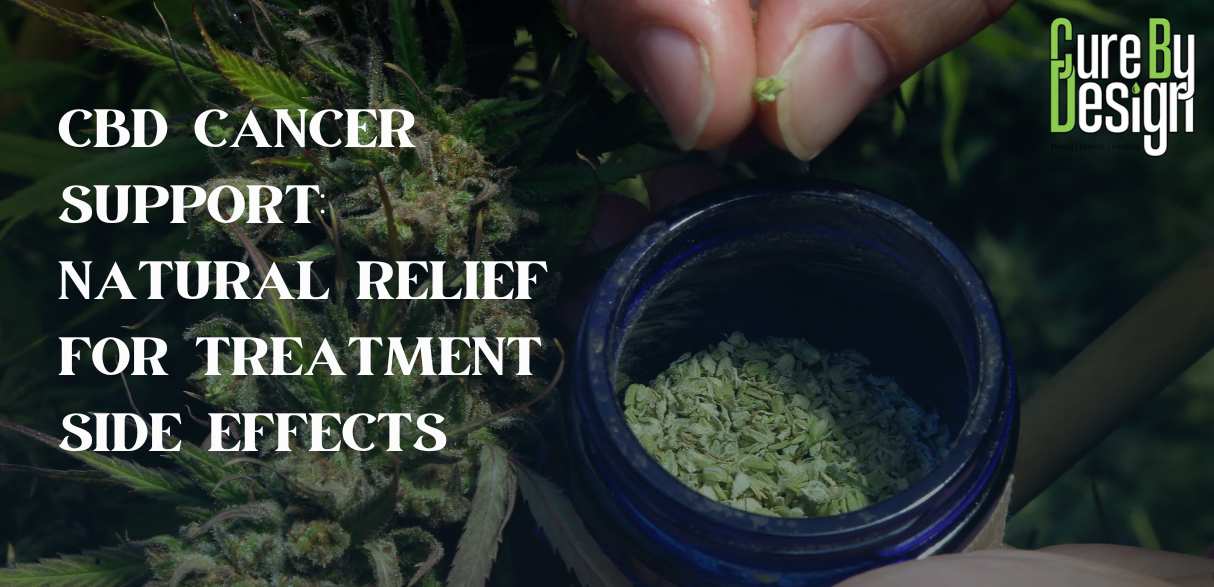
CBD Cancer Support
When Priya received her cancer diagnosis, the overwhelming flood of medical terminology, treatment options, and side effect warnings felt almost as frightening as the diagnosis itself. Like thousands of cancer patients across India, she found herself searching for ways to manage the challenging side effects of chemotherapy and radiation while maintaining some quality of life during her healing journey.
The nausea that made eating impossible. The chronic pain that sleep couldn’t ease. The anxiety that consumed quiet moments. These aren’t just statistics in medical journals – they’re daily realities faced by cancer patients and their families who are desperately seeking relief beyond conventional medications.
While CBD cannot cure cancer, emerging research and patient experiences suggest it may offer significant support in managing treatment-related side effects, providing a natural complement to traditional cancer therapies that Indian patients are increasingly exploring.
Understanding Cancer Treatment Challenges in India
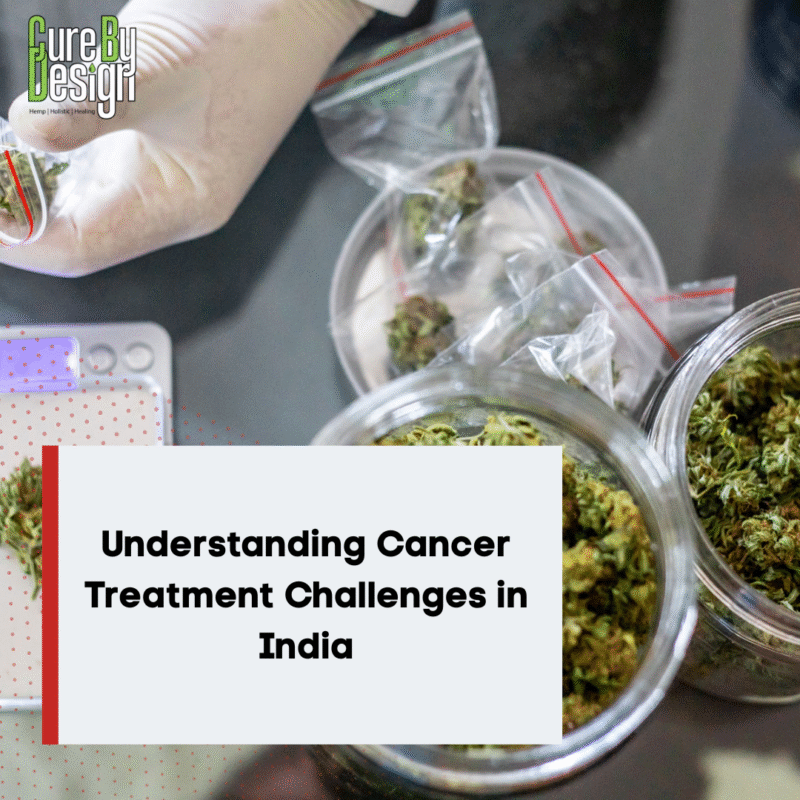
Cancer treatment in India presents unique challenges that extend beyond medical protocols. Family dynamics, cultural considerations around pain expression, and varying access to supportive care create complex situations where natural supportive therapies like CBD become particularly valuable.
Common Treatment Side Effects Affecting Indian Patients:
- Chemotherapy-induced nausea and vomiting affects nearly 80% of patients, often leading to dangerous weight loss and treatment delays that compromise recovery outcomes.
- Chronic pain from both the disease and treatments can be undertreated due to cultural stigmas around pain medication and concerns about addiction in Indian families.
- Sleep disturbances compound other side effects, creating cycles of fatigue that affect healing and emotional wellbeing.
- Appetite loss becomes particularly challenging in Indian households where food represents love, care, and cultural connection.
- Anxiety and depression often go unaddressed due to mental health stigmas, despite affecting up to 60% of cancer patients.
- Neuropathy from certain chemotherapy drugs can cause debilitating nerve pain that persists long after treatment ends.
The Science Behind CBD for Cancer Support
Research into CBD’s potential benefits for cancer patients has expanded significantly in recent years, with studies examining how cannabinoids interact with the body’s endocannabinoid system to potentially alleviate treatment-related symptoms.
How CBD May Help Cancer Patients:
- Nausea and Vomiting Control: CBD interacts with serotonin receptors in the brain that regulate nausea, potentially offering relief when conventional anti-nausea medications fall short.
- Pain Management: The endocannabinoid system plays a crucial role in pain perception, and CBD may help modulate pain signals while reducing inflammation.
- Appetite Stimulation: CBD may help restore appetite by interacting with receptors that influence hunger and food enjoyment.
- Sleep Quality Improvement: By potentially reducing anxiety and pain, CBD may help normalize sleep patterns crucial for healing.
- Mood Stabilization: Early research suggests CBD may have anti-anxiety and antidepressant-like effects that could support emotional wellbeing during treatment.
Important Note: CBD should never replace prescribed cancer treatments. Always consult with your oncology team before adding any complementary therapies to your treatment plan.
Evidence-Based Benefits for Treatment Side Effects

While research continues, existing studies provide encouraging insights into CBD’s potential as supportive care for cancer patients experiencing treatment side effects.
Research Highlights:
- Nausea Management: Multiple studies indicate that cannabinoids may be effective for chemotherapy-induced nausea, particularly in cases where conventional medications aren’t sufficient.
- Pain Relief: Research suggests CBD may help manage cancer-related pain through anti-inflammatory effects and interaction with pain-processing pathways.
- Appetite Enhancement: Studies show cannabinoids may help restore appetite and reduce weight loss associated with cancer treatments.
- Quality of Life: Patient-reported outcomes consistently show improvements in overall quality of life measures when CBD is used as supportive care.
- Sleep Improvement: Clinical observations suggest CBD may help normalize sleep patterns disrupted by treatment side effects.
Discover how Cure By Design’s premium CBD products can support your journey toward better symptom management and improved quality of life during cancer treatment.
CBD Product Options for Cancer Support
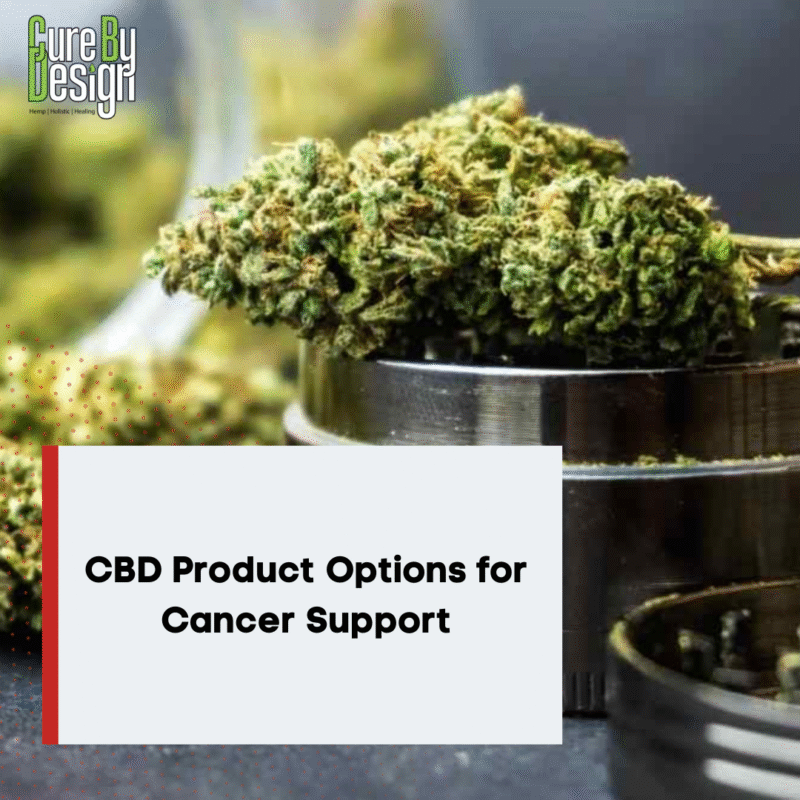
Different CBD formulations offer varying benefits for cancer patients, and understanding these options helps in making informed decisions about supportive care approaches.
Full-Spectrum CBD Products:
Full-spectrum CBD contains all hemp plant compounds, including trace amounts of THC, which may enhance therapeutic effects through the entourage effect. This option might provide the most comprehensive symptom relief.
Benefits for cancer patients:
- Enhanced pain management through synergistic compound interactions
- More effective nausea control
- Better appetite stimulation
- Improved sleep quality
Considerations: Contains trace THC amounts that could appear on drug tests
Broad-Spectrum CBD Products:
Broad-spectrum CBD offers many entourage effect benefits while completely removing THC, making it suitable for patients concerned about drug testing or THC sensitivity.
Advantages:
- Comprehensive symptom management without THC
- Professional and family-friendly option
- Reduced risk of drug interactions
- Maintains therapeutic compound diversity
CBD Isolate Products:
Pure CBD isolate provides predictable, targeted effects without other hemp compounds, ideal for patients with multiple medication sensitivities.
Best for:
- Patients with medication interaction concerns
- Those preferring precise dosing control
- Individuals sensitive to other cannabinoids
- First-time CBD users seeking simple introduction
Dosing Guidelines for Cancer Patients
Cancer patients often have compromised systems and multiple medications, making careful dosing approaches essential for safe and effective CBD use.
Starting Safely:
- Begin with minimal doses: Start with 2.5-5mg daily and monitor effects for at least one week before adjusting.
- Gradual increases: Increase by small amounts (2.5-5mg) every few days based on symptom response and tolerance.
- Timing considerations: Take CBD with food to improve absorption and reduce potential stomach upset.
- Consistency matters: Regular dosing helps maintain steady levels for consistent symptom management.
- Medical supervision: Work closely with healthcare providers to monitor interactions with cancer treatments.
Symptom-Specific Approaches:
- For nausea: Take CBD 30-60 minutes before anticipated nausea periods or treatments.
- For pain: Consistent daily dosing often works better than as-needed approaches.
- For sleep: Take CBD 1-2 hours before bedtime for optimal effects.
- For appetite: Small doses before meals may help stimulate hunger.
Safety Considerations and Drug Interactions
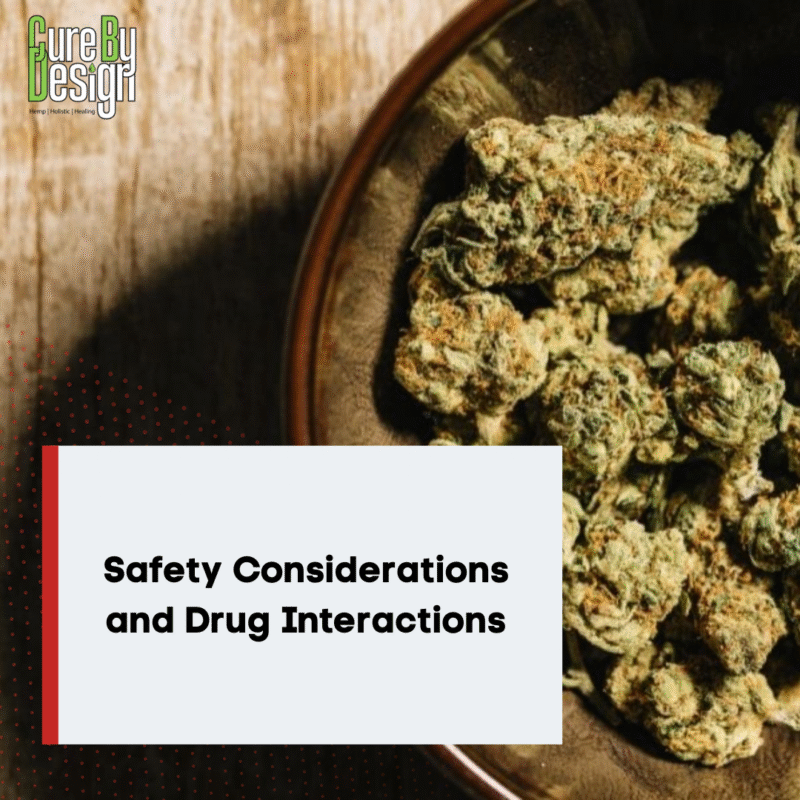
Cancer patients must carefully consider potential interactions between CBD and their treatment protocols, as safety remains the top priority during cancer care.
Important Safety Factors:
- Medication interactions: CBD can affect how the liver processes certain medications, potentially altering their effectiveness or increasing side effects.
- Chemotherapy considerations: Some chemotherapy drugs may interact with CBD, requiring careful timing or dosage adjustments.
- Immune system effects: While generally well-tolerated, CBD’s effects on immune function need consideration during cancer treatment.
- Quality concerns: Cancer patients need the highest quality products to avoid contaminants that could compromise already fragile health.
Essential Precautions:
- Always inform your oncologist about CBD use
- Start with products from reputable manufacturers with third-party testing
- Monitor for any changes in treatment effectiveness or side effects
- Keep detailed records of CBD use and symptom changes
- Never stop prescribed medications without medical supervision
Choose Cure By Design’s rigorously tested, medical-grade CBD products specifically formulated with cancer patient safety and efficacy in mind.
Indian Cultural Considerations for Cancer Patients
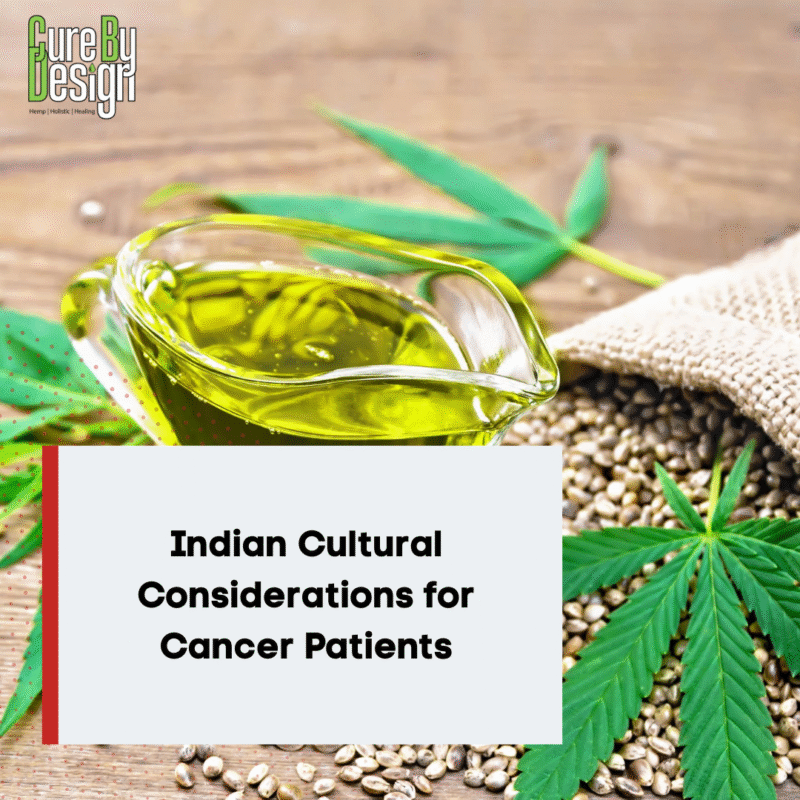
Using CBD as cancer support in Indian families requires addressing cultural sensitivities, family dynamics, and traditional healing perspectives that influence treatment decisions.
Navigating Family Discussions:
- Educational approach: Share scientific research with family members who may be skeptical about hemp-derived products.
- Emphasize support, not cure: Clearly communicate that CBD is supportive care, not alternative treatment, to address family concerns about abandoning proven therapies.
- Connect to tradition: Highlight how CBD use aligns with India’s historical use of plant medicines for healing support.
- Medical endorsement: Having oncologist approval can help gain family acceptance and support.
Integration with Traditional Approaches:
Many Indian cancer patients benefit from combining CBD with traditional supportive practices like:
- Ayurvedic dietary approaches
- Meditation and yoga practices
- Family support systems
- Spiritual and religious coping mechanisms
Real-World Considerations for Indian Patients
Practical factors specific to the Indian healthcare system and family structures impact how cancer patients can successfully integrate CBD into their supportive care routines.
Healthcare System Navigation:
- Doctor communication: Prepare specific questions about CBD interactions with your treatment protocol.
- Documentation: Keep records of CBD use to share with medical teams during appointments.
- Insurance considerations: Understand that CBD products typically aren’t covered by insurance and budget accordingly.
- Treatment facility policies: Some hospitals may have policies about complementary therapies that affect CBD use.
Family and Social Factors:
- Caregiver education: Ensure family caregivers understand proper CBD use and potential benefits.
- Social stigma management: Address misconceptions about hemp products within your social circle.
- Community support: Connect with other cancer patients who have experience with CBD for peer support and practical advice.
Making Informed Decisions About CBD Cancer Support
The decision to incorporate CBD cancer support requires careful consideration of individual circumstances, treatment protocols, and personal values about complementary therapies.
Key Decision Factors:
- Current symptom severity: Consider whether existing medications adequately manage side effects or if additional support could improve quality of life.
- Treatment phase: Different phases of cancer treatment may benefit from different supportive approaches.
- Family dynamics: Ensure family support for complementary therapies that enhance overall care quality.
- Financial considerations: Budget for high-quality CBD products as part of comprehensive care planning.
- Medical team collaboration: Choose products and approaches that complement rather than complicate existing treatment plans.
Your Path Forward: Integrating CBD into Cancer Care
Cancer treatment is challenging enough without the added burden of severe side effects that compromise quality of life. While CBD isn’t a cure, it represents a promising tool for managing treatment-related symptoms that can make the healing journey more bearable.
Take the next step toward better symptom management. Consult with your oncology team about incorporating Cure By Design’s premium CBD products into your comprehensive cancer care approach.
Remember that every cancer journey is unique, and what works for one patient may not work for another. The key is working closely with your healthcare team to develop a comprehensive approach that includes both proven medical treatments and supportive therapies that enhance your quality of life during this challenging time.
Your healing journey deserves every possible support, and CBD may be one valuable tool in your comprehensive approach to cancer care and recovery.

